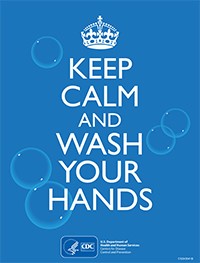As concern over the anticipated spread of the coronavirus strain known as COVID-19 increases, employers should consider its impact on the workplace. The Center for Disease Control (CDC) has published interim guidance for businesses who want to take a proactive approach. You can read the full guidance on the CDC’s Coronavirus Disease 2019 website. The CDC also offers Fact Sheets about the virus as well:
https://www.cdc.gov/coronavirus/2019-ncov/about/share-facts.html and https://www.cdc.gov/coronavirus/2019-ncov/downloads/2019-ncov-factsheet.pdf.
Here are some best practices from the CDC to help stop the spread of COVID-19:
- Educate your employees on proper hygiene such as:
- Washing your hands with soap and water for at least twenty (20 seconds);
- Using alcohol-based hand sanitizer that contains at least 60% alcohol, if soap and water are not available;
- Avoiding close contact with people who are sick;
- Avoiding touching your eyes, nose and mouth with unwashed hands;
- Covering your coughs and sneezes with a tissue, followed by throwing it in the trash; and lastly,
- Cleaning and disinfecting routinely touched surfaces regularly
- Tell sick employees to stay home.
- If employees come to work with symptoms such as fever or cough, send them home. Instruct them to stay home until they are free of symptoms for at least 24 hours, without the use of a fever reducing or other symptom-altering medicine, such as cough-suppressants.
Besides CDC guidance that pertains to containing the spread of the virus, here are some other things to think about as far as its impact on the workplace:
- Company Travel – If your company requires employees to travel, make sure you are regularly reviewing CDC travel advisories. You may want to suspend travel to any Level 2 (practice enhanced precautions) or Level 3 (avoid nonessential travel) countries. The CDC Travel Advisory Map can be found here.
- Personal Travel – You may also want to issue a notice or adopt a policy that requires employees to report any personal travel to Level 2 or 3 countries to Human Resources.
- Employees Refusing to Travel – Think about how you will respond if you require employees to travel for work and they refuse. Your reaction may depend on whether the travel is to a Level 2 or 3 country or whether it’s to a Level 1 country (i.e. practice usual precautions).
- Leave Laws and Policies– If an employee or their family member tests positive for COVID-19, certain leaves laws and policies, like the Family Medical Leave Act, the Americans with Disabilities Act and state paid sick leave policies will most likely come into play. Your paid time-off policies may come into play as well. Be prepared to analyze and potentially grant leave under these laws and policies.
- Fit for Duty Exams – If an employee tests positive for COVID-19, its most likely that the employer is legally permitted to get a return-to-work note showing the employee is virus free and not a risk to others before returning to work. This note may come from a public health official if the person has been quarantined.
- Wage and Hour Concerns When an Employee is Sick and is Off of Work – If an employee is sick and cannot work due to testing positive for COVID-19, whether or not the employer has to pay the employee while off work will depend on company policy, state paid sick time laws and whether the person is exempt or not from overtime pay.
- Wage and Hour Concerns When a Company Faces a Negative Economic Impact due to COVID -19 – Certain businesses, like the travel and hotel industries, have already been negatively impacted by this virus. This might require the employer to think about changes in its staffing levels such as a reduction in force, furloughs, shift changes and separation programs. Each of these considerations carry risk including compliance with wage and hour law and should be discussed with an experienced HR professional or employment attorney.
If we could offer once last piece of important advice, it would be to remember to remain calm and regularly wash your hands.
*article courtesy of Keystone







